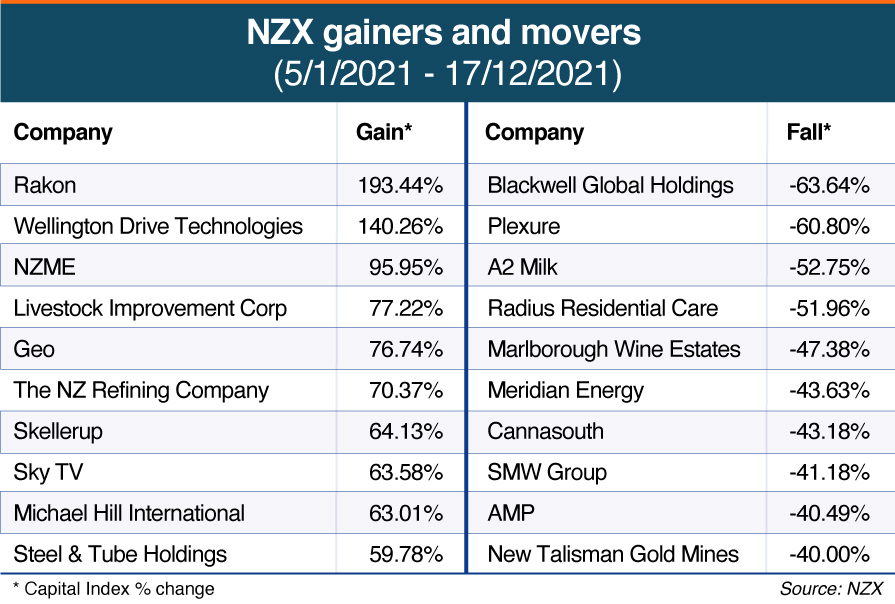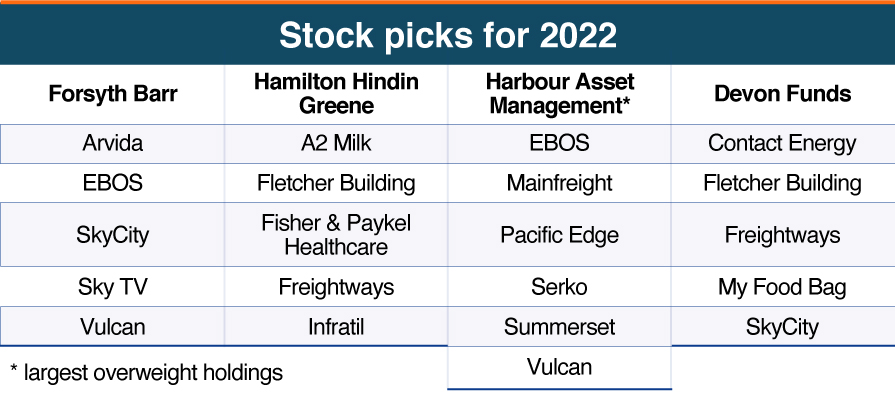The stocks to watch in 2022
Inflation and reopenings in the spotlight as post-GFC bull run slows.
Inflation and reopenings in the spotlight as post-GFC bull run slows.
The NZX has just recorded its first down year in a decade.
Supply chains are a mess. Countries are still grappling with vaccinations and possible lockdowns as Covid-19 variants take hold. Inflation doesn’t look so transitory after all.
“The long market bull run since the GFC appears to be ending as the structural decline in interest rates has reversed,” Forsyth Barr says.
“It's going to be really choppy,” adds Harbour Asset Management portfolio manager Shane Solly. “We will see a few more weeks and months where there's potentially negative returns.”
There’s been a marked shift in attitudes to how markets might perform in the year ahead compared to this time last year.
While 2021’s preview noted there were still pockets of Covid-19 uncertainty, most analysts and brokers NBR spoke to painted a picture of optimism with the imminent rollout of vaccines.
“The year of the virus makes way for the year of the vaccine, or at least we hope,” Forsyth Barr said last year. “Despite apparent Armageddon for the markets in March and continued challenging health situations in many countries, the global economy is learning to live with Covid-19.”
Instead, 2021 was again dominated by the tension between Covid restrictions and reopenings, fuelled by emerging variants of the virus such as Delta and most recently, Omicron.
The influence of central banks was mentioned just three times in last year’s preview, however.

Inflation, inflation, inflation
Instead, inflation and central bank tightening dominated markets in 2021 and are widely pointed to as the major non-Covid influence on markets for 2022 (albeit clearly influenced by the virus).
The Reserve Bank of New Zealand was first to move, increasing the Official Cash Rate for the first time in seven years to 0.50% in October. Another hike in November lifted it to 0.75%, with much more to come in 2022.
In turn, the benchmark NZX50 index fell nearly 5% in 2021, underperforming other global markets (the ASX200 was up about 9% and the S&P 500 up 25%, for instance).
“This was due to the marked increase in underlying interest rates in the last 12 months,” Hamilton Hindin Greene investment adviser Grant Davies says. “The Reserve Bank of New Zealand is one of the few in the world that have begun increasing interest rates, which makes NZ an outliers among its global peers.”
Now, the US Federal Reserve is rapidly speeding up the tapering of its US$120 billion monthly asset purchase programme and is expected to finish up by March. Up to three rate hikes are expected in 2022.
“Inflation has accelerated through 2021 and will likely remain high through 2022,” Forsyth Barr says. “This supports our view of constrained market performance as equities generally perform poorly during inflationary periods, as margins typically contract, uncertainty increases and valuation multiples ultimately fall.”

Ups and downs
A tricky 2021, then, but some stocks still performed remarkably well.
Rakon had a year to remember as its shares rose more than 193% (in the year to December 17), after the company was able to adapt and scale-up its operations to secure new business stemming from worldwide shortages of TCXO chips (a factory fire in Japan in 2020 temporarily wiped out the biggest global supplier of the chips).
The company has repeatedly upgraded its earnings guidance during 2021, now expecting underlying ebitda in the year ending March 31, 2022, of between $44 million and $49m. It anticipates paying its first dividend in March as a result of the massively improving financial performance.
Another strong performer during 2021 was Sky TV, up more than 60% (in the year to December 17), having stabilised its losses and continued its turnaround.
Others with impressive years include Wellington Drive Technologies, NZME and Steel & Tube Holdings.
On the other end, Plexure and A2 Milk are the most notable declines, falling more than 60% and 52% in the year to December 17, respectively.
Plexure announced it was axing 55 roles just before Christmas, saving itself $8m, after a review of the business by its new management team (following the acquisition of Task) identified it had been unsustainably burning through cash and its former growth strategy was failing.
A2, meanwhile, had a well-publicised horror year involving a series of profit warnings triggered by a collapse in sales of its most profitable infant formula product in China, wiping more than $11b off the company’s market value.
Meridian Energy’s 43% drop, meanwhile, highlights a tough year all-round for the country’s listed gentailers.

Leading the charge
Harbour’s Solly says investors were reminded of five key lessons in 2021: equity markets go up and down; they’re not a mirror of economies; businesses are pretty good at adapting; structural trends can last for a long time; and the importance of patience.
“After a sharp lift in activity in 2021 over 2020 it's likely we will see a fall back to a more normal rate of growth,” he says. “The removal of supportive monetary policy is trying to take some pressure out of the economy.”
But he still sees positive returns from markets by this time next year, driven by growing economies and companies having adapted to the pandemic by holding more inventory and being a bit more conservative.
He points out that despite a dip in the NZX this year, it was important to recognise its strength over the longer term.
“The New Zealand market’s been disappointing this year for investors, but if I put it in the context of the last 20 years it's done really well, it's been a great, great place for people to protect their greater wealth. It's just under 10% per annum returns,” he says.
“We've had a weaker year but our central bank has been at the vanguard of the tightening process, so our market has reacted to that.”
He’s also keeping an eye on the potential for further M&A activity in the local market.
“We’ve got a lot of businesses that are good cash-flow generating businesses with appropriately geared balance sheets that are attractive globally.”
Devon Funds head of retail Greg Smith is optimistic given the economy was in good shape and there were potential IPOs in the pipeline.
“The New Zealand (market) has to do better than it did last year, in a relative sense and an absolute sense,” he says. “And maybe the RBNZ slows down its rate hike process so maybe that helps sentiment as well.”
Davies adds: “The fact that the NZX has led the charge in terms of adjusting to a higher interest rate environment means the market is relatively well placed heading into 2022.”

The 2022 stock picks
Forsyth Barr
The only pick Forsyth Barr is carrying from 2021 to 2022 is Ebos Group (which was up more than a third during 2021 to trade at more than $37).
Its one of two companies it has identified as having “pass through” business models which are largely sheltered from inflation, alongside recently-listed Vulcan Steel.
On Ebos, Forsyth Barr says its robust valuation relative to the rest of the New Zealand market, as well as its potential for further inorganic growth opportunities – in December it made its sixth acquisition of the last 12 months with the A$1.17b purchase of medical device distributor LifeHealthcare - underpins its positive view of the stock.
“Ebos is a well-run business with a defensive earnings profile and market leading positions across a number of its core segments,” Forsyth Barr says. “Ebos has expertly managed the Covid-19 volatility to date and we are attracted to its track record of execution, strong cash conversion, market leading positions, and positive underlying organic earnings momentum.”
On Vulcan, meanwhile, Forsyth Barr expects growth, particularly in Australia where the business only has a minor market share.
“We expect VSL to be able to weather fluctuations in steel and input prices well given their high levels of service, operational discipline, experienced management team and strong relationships with both customers and suppliers.”
Its other picks include retirement village operator Arvida, a “coming of age” choice given it’s set to deliver its first green field village, as well as Sky TV, for which it has “cautious optimism” even after a strong 2021 in which the share price lifted two-thirds following cost cutting and refreshed strategies.
Its final pick is SkyCity, which picks up on one of its main investment themes for 2022: reopening vs restrictions. Australasia should enjoy greater freedoms in 2022 relative to recent restrictions and closed borders, Forsyth Barr, which bodes well for a recovery in tourism and retail stocks.

Devon Funds Management
Another backing SkyCity is Devon’s Smith who sees the stock as a cheap reopening play with fewer regulatory headwinds than its casino peers in Australia.
“Longer-term, there’s also that move to more in terms of the online space.”
He also has two valuation picks, based on stocks he’s picking will come back after struggling in 2021. Those are Contact Energy and My Food Bag.
On Contact, Smith says the gentailers had a tough year but Contact was arguably the cheapest within the sector.
Regarding My Food Bag, Smith was backing the company to be able to add customers and broaden the offering. My Food Bag’s share price has fallen from its $1.85 listing price – the largest NZX IPO since 2014 – to a low of $1.10 in December.
He thought its lagging performance was down to the IPO being at a “very full price”, bad timing (March last year) and coming at the peak of the global popularity in meal kits on the back of the pandemic.
“They’ve delivered in line [with prospectus forecasts], they haven’t really done a lot wrong. It’s just purely a reflection of the valuation when it came to market.”
Smith’s other picks include Freightways and Fletcher Building, with the former having been a Covid-19 beneficiary which is now building on the upswing on freight volumes to expand its e-commerce offering.
Fletchers, meanwhile, is poised to benefit from economic activity.
“Consents are at record levels, the economy is doing well on both sides of the Tasman, construction is strong… You only need to look at the number of cranes in the sky in New Zealand and also Australia. I think that continues to be a theme in 2022.”

Hamilton Hindin Greene
Another backing both Fletchers and Freightways is Davies at Hamilton Hindin Greene.
“Freightways are adding market share in their cornerstone express package market, whilst at the same time seeing that total market grow due to the proliferation of online shopping and just-in-time inventory,” he says.
Fletchers, meanwhile, has benefitted from a streamlining of the business in recent years.
“They are also set to benefit from a continuation in new builds, both residential and commercial. Some regulatory risk remains given the heavy market share the company has in some areas of the housing supplies market, but their scope in that area is also attractive from an investors point of view.”
His other picks include Infratil and Fisher & Paykel Healthcare, which he backs to have another strong year even if it is unlikely to match the meteoric rise seen in 2019 and 2020.
And just like 2021, Davies is again backing A2 Milk, although notes it is “very dependent on a few things going their way”.
A2’s chair David Hearn in November described 2021 as a “tumultuous year” which saw the milk marketer’s share price fall from above $20 in August 2020 to around $5.73 in late December.
The result for the year to June 2021 – revenue down 30% to $1.2b and profit down 79% to $80.7m – was “disappointing”, managing director David Bortolussi told shareholders at its November AGM.
“They are well-positioned for a good turnaround story,” Davies says. “The company’s brand strength will be key in the very competitive Chinese infant formula market, however, if they can maintain and start to grow market share in the region then we expect to see the share price to follow."

Harbour Asset Management
Harbour’s Solly says his six stocks are the ones the manager is most overweight in, rather than out and out picks.
Those companies are Mainfreight, Pacific Edge, Summerset, Ebos, Vulcan and Serko.
Summerset, Ebos and Pacific Edge all benefit from an ageing populating and increasing healthcare spend, he says, while Mainfreight is flourishing on the back of improving logistics and supply chains.
Vulcan, meanwhile, could represent domestic growth as some manufacturing businesses perhaps return to New Zealand off the back of the pandemic.
“We've got fantastic people running businesses here in New Zealand that are very innovative in terms of producing great products and services and rethinking how they do business,” Solly says. “We’ve got to deal with Covid for a long time, companies have put some changes in place… 2022 is about getting on with it.”
Disclaimer: Information about these companies is not intended as financial advice. Readers should obtain professional advice before making investment decisions. Copies of disclosure statements of NZX adviser firms mentioned in this article can be obtained by contacting the firms.
Sign up to get the latest stories and insights delivered to your inbox – free, every day.